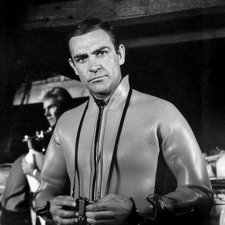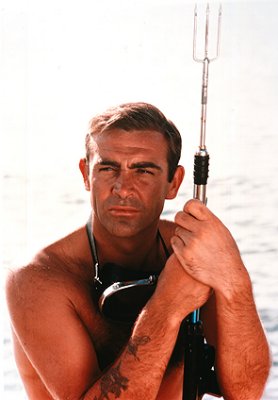 Sir Sean Connery’s fourth smash-hit 007 movie Thunderball celebrates its 50th birthday later this year and, as part of the JBIFC’s 2016 celebration of the classic Bahamas-set James Bond adventure, we are taking a look at various aspects of the marketing of the film, a sales campaign which – in many ways – helped create the rise of mid-1960s ‘Bond-mania’.
Sir Sean Connery’s fourth smash-hit 007 movie Thunderball celebrates its 50th birthday later this year and, as part of the JBIFC’s 2016 celebration of the classic Bahamas-set James Bond adventure, we are taking a look at various aspects of the marketing of the film, a sales campaign which – in many ways – helped create the rise of mid-1960s ‘Bond-mania’.
A recently rediscovered transcript of an interview with Connery can give us some interesting insights into how the first Bond star viewed the challenges of being 007 at the time, and how the franchise helped pioneer the use of radio marketing for major films during the early to mid 1960s.
United Artists (UA) marketing executives put lots of energy and imagination into marketing 007 in key American markets in particular, especially after the huge success of Goldfinger, and radio campaigns became a very important part of this strategy. Quick radio interviews, easy on the ear and with a ‘personal’ touch, were increasingly used by the studio to help grab the attention of casual radio listeners and raise awareness about the latest 007 movie. We recently came across one such interview in our archives. The interview was first published in the Club’s 007 magazine back in 1981 (no.9, December 1981), and was also covered in a news item we published in 2012.
But we thought fans of Thunderball might enjoy reading it again, given the movie’s impending birthday. Enjoy…!
JBIFC Background Note.
The brief interview (known in the trade as an ‘open ended’ interview) was conducted with Sean Connery in 1964/5 and was put on to vinyl LP record (and sometimes also on to reel-to-reel tape), and was sent to local radio Stations across the various States of America. The radio Station would play the record and a gap would come before Connery’s reply, so enabling the presenter or ‘D.J.’ of that Station to pose questions and sound as if they had recently conducted an interview with Connery especially for that radio Station. It was all part of the increasingly sophisticated way that United Artists marketed the James Bond movies in the USA, and gives some interesting insights into how UA helped build Sean Connery into an international star who, at the same time, retained a very down-to-earth persona.
The Transcript.
DJ: Today, our guest is the international star, Sean Connery, the dynamic secret agent 007 of the popular James Bond films, Dr. No, From Russia With Love and Goldfinger. Sean Connery spoke with us right from the set of the new James Bond thriller Thunderball, in London. Hi, 007, how are you?
Connery: I’m very well, indeed, thank you. When I come up for air… I’ll be there in a minute. I’m in the process at the moment of organising a house, or finishing a house – and I’ve just finished working through the night shooting.
DJ: At Smersh, no doubt!
SC: (Laughs).
DJ: Sean, so far you’ve made Dr. No, From Russia With Love, and Goldfinger. I suppose in the beginning, it was quite a challenge being cast as James Bond with people all over the world having their own idea of what he should be like.
SC: Well, I’m afraid they’ll just have to accept mine now. I couldn’t possibly cater to all of Ian Fleming’s fans, that’s for sure. But having had two or three meetings with Fleming before we started the film, and worked out what I wanted to do with it, and then we had long discussions with Terence Young, the director, before we started. We got a pretty fair picture, I think, of what it was about.
DJ: I understand you were picked as James Bond by the fans themselves in a newspaper poll in London. Is that so?
SC: Well, I don’t know just how much truth there is in that. Fleming’s books have been around for quite a long time now and sort of accumulated a fantastic success. They have snowballed, you know, and they’ve been good film material. From what I can gather, they had a bit of a problem getting a deal that would satisfy Fleming, in so much that he didn’t particularly want an internationally accepted face that was sort of established in that way. He wanted somebody who would be young enough and in the right sort of bracket to do most of the feats. And I saw them and discussed it and said what I thought it was all about… but, I was over in Canada doing Macbeth and they had one of the nationwide contests and… well, here I am.
DJ: Why do you think these pictures are so enormously successful now all over the world?
SC: I think part of its popularity in this country was due to the fact that he came along just after the War, when they’d had lots and lots of rationing and things, and then suddenly this character came on the scene who lived extremely well, ate well, was rather finnicky and eccentric almost to a terrifying degree about what was good to eat… and pages and pages on good food, etc, etc. Plus the fact there was a lot of sexual involvement, which is always pretty healthy. You know, you can’t disguise the fact that it’s around, otherwise, there’d be nobody here.
DJ: Most actors have a background of various jobs. I know you were a chorus boy, a milkman, and a boxer at various times. What else is in the background of this international favourite, Sean Connery?
SC: Well, I was in the Navy – which helped a bit, I think. I was a steel bender-fixer. I was a plasterer’s labourer and was a lifeguard. I was a French polisher, a long distance lorry driver. I worked in a newspaper office – uh – I forget…
DJ: What about this tremendous fame now? With the success of all the James Bond pictures, does this scare you?
SC: No, there’s a steady increase in that. It’s not an… I don’t think it’s a sort of overnight thing. It’s been a sort of gradient. And where I live now, down in Acton, I have a nice house, quite sort of secluded – although it’s on a public park and that. And the people are very good, I must say, down there. They don’t bother you very much – even in the shops when I have to get something – then it’s a bit of a lark, you know. But they come by the house and they’re rather good. They don’t sort of clamber over or stare in the windows or any of these things at all.
DJ: Everyone likes you so much – I wonder who your favourite actors are?
SC: My favourite actor actually is Ralph Richardson – Sir Ralph Richardson.
DJ: How big do you want to be? How far do you want to go?
SC: Well, as long as I keep enjoying what I’m doing and keep interested and excited in what I’m doing, then I’ll just go on – and on – and on, I suppose. But then if I have a change of heart and mind, then I shall just divert and do something else.
DJ: What do you do when you’re not making all these great movies?
SC: I don’t know. When I’m not working, I seem to be trying to make some preparations for work. I really have to be involved in work or something physical like… I’ve now taken up golf which seems to be a splendid compensation. I normally play soccer, but I can’t always find 21 other fellows who want to play. And I play chess and I read a lot, you know. And I have a fair collection of records…
DJ: And a pretty fair collection of pictures, too, I’d say. I’m sure I speak for everyone when I tell you how much we enjoy them and look forward to those still to come.
SC: Thank you very much indeed…
DJ: It’s been a pleasure to talk with you, Sean Connery.
SC: It was my pleasure, too. Thank you.
DJ: You have just heard an interview with Sean Connery, star of the popular James Bond films.

